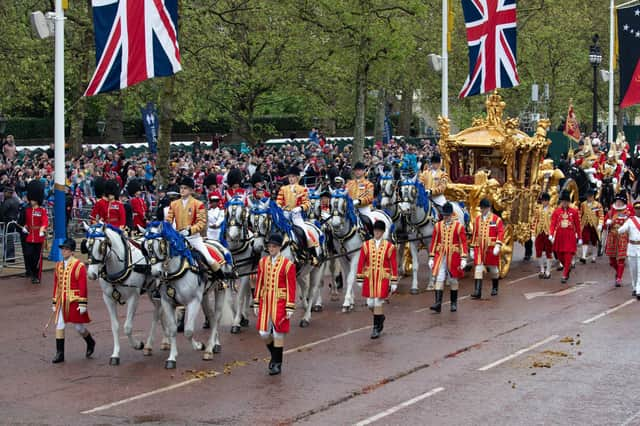Owen Polley: Coronation ceremony reminded us that we have a national story that shaped the modern world, liberal democracy and western civilisation


It’s a chance to think about what the weekend meant to the nation and whether it said anything important about the state of our Kingdom.
Naturally, the ceremony did not please everyone. For some people, the changes introduced by Charles III were unwelcome. They felt uncomfortable with the overtures to other religions, believing that it undermined the King’s role as the head of the Church of England. Or they regretted that the event involved fewer guests and was briefer than Elizabeth II’s coronation.
Advertisement
Hide AdAdvertisement
Hide AdIt should be said, though, that the ceremony in 1953 was different to those that preceded it too. In particular, it introduced modern innovations like live television coverage, and reflected the fact that the British Empire was shrinking. The royal family adapted to changes in society then, as it continues to do today, and that is part of its success as an institution. The king is a figurehead, and, while a minority opposes the idea of a hereditary head of state, the monarchy draws together people of different backgrounds, political outlooks and faiths.
The coronation was a happy occasion, while the Queen’s death was a time of mourning. But both events allowed people in this country to set aside their differences, so that they could focus for a time on all the things – constitutional, historical and cultural – that they share. In the UK, we badly needed this opportunity to come together, after all the divisions over Brexit since 2016, the trauma of lockdown and new worries about our ruptured economy. These problems won’t go away. But the coronation reminded us that there is a continuity to our country’s history – a long view of Britain’s place in the world and its contribution to the West – that fires people’s emotions and provides a focus for their loyalty, above and beyond the arguments and anxieties of day to day politics.
In Northern Ireland, as in the rest of the UK, we got the perfect opportunity to express our support and enthusiasm for the new king, or simply enjoy the pomp and pageantry of an event that may not happen again in our lifetimes. There were public events that contributed to the festive mood, and children in many schools had a chance to celebrate by dressing up, putting on shows or designing coronation artworks.
Inevitably, some of the focus was on the guest list at Westminster Abbey and, in particular, Michelle O’Neill’s decision to attend. I’m sure that Sinn Fein’s Northern Ireland leader believed genuinely that she was making a brave and generous gesture, not least because it made some republicans distinctly uncomfortable. You don’t need to be an arch cynic, though, to suspect that her party will exploit its supposed generosity ruthlessly. In a column in the Belfast Telegraph last week, Malachi O’Doherty noted that her attendance would cause unionists to ask, “what reciprocation will be expected of them”.
Advertisement
Hide AdAdvertisement
Hide AdAs the writer pointed out, Ms O’Neill is an elected representative in the UK, who was attending a ceremony to crown this country’s head of state. Don’t be surprised, though, if her decision is used to imply that unionists are mean-spirited, disrespectful or even hate-filled if they refuse to act in a way that suggests the Republic’s symbols or ceremonies are relevant and appropriate to Northern Ireland.
It will be up to unionist leaders to sidestep these traps. They can do that best by recognising the value of Irish culture, in order to broaden the appeal of the UK, but refusing to allow issues of sovereignty and identity to be confused. Our politicians have not always been adept at understanding the difference or untangling these complexities in the past. They should be aware of these pitfalls, but they should also take an unprecedented opportunity to emphasise the continued importance of belonging to the UK and its institutions.
The coronation was an event, like the late Queen’s funeral, that spoke to the quiet, unspoken unionism that many people feel in Northern Ireland, but that struggles to find a political expression. It showed how the institution of monarchy, like our nation state, has changed and adapted through the centuries, while holding on to traditions that date back more than 1,000 years. Many European countries, including the Irish republic, grew out of eighteenth and nineteenth century separatist and romantic nationalist movements. In contrast, some of the symbols and customs involved in the coronation have been in continuous use, and have retained their significance, since the tenth century.
It reminded us that we have a national story that shaped the modern world, liberal democracy and western civilisation in a way that is surely unique. And it conjured up allegiances and affinities that have bound together successfully people of different backgrounds, races and religions, as well as the histories of Ireland, England, Scotland and Wales, for centuries. The coronation was an opportunity, most of all, to reflect on what the United Kingdom means and why being part of it is valuable. While it’s easy to get caught up in the passing debates, injustices and frustrations of the moment, sometimes we need a chance, as a nation, not only to celebrate what draws us together, but to pause and take a calmer look at our history and place in the world.